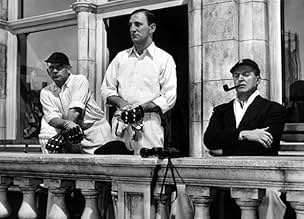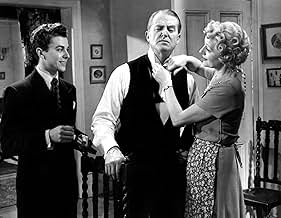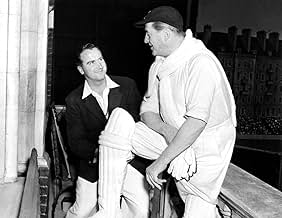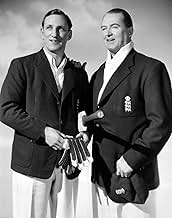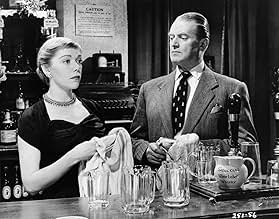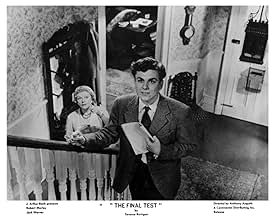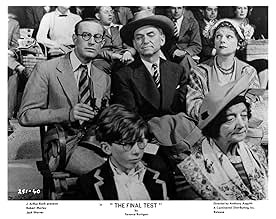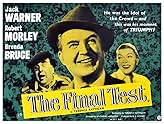Sam Palmer is a cricketer about to play the final test match of his career. His schoolboy son Reggie is a budding poet who disappoints him by not attending the penultimate day's play. Unexpe... Read allSam Palmer is a cricketer about to play the final test match of his career. His schoolboy son Reggie is a budding poet who disappoints him by not attending the penultimate day's play. Unexpectedly, Reggie is invited to the home of poet and writer Alexander Whitehead. Reggie fears... Read allSam Palmer is a cricketer about to play the final test match of his career. His schoolboy son Reggie is a budding poet who disappoints him by not attending the penultimate day's play. Unexpectedly, Reggie is invited to the home of poet and writer Alexander Whitehead. Reggie fears he will also miss the final day--and therefore Sam's last innings--but it turns out that ... Read all
- Cricket Match Spectator
- (uncredited)
- Frank Weller
- (uncredited)
Featured reviews
It's directed by Anthony Asquith from a script by Terence Rattigan; originally it was broadcast by the BBC with an entirely different cast. Although Warner and Morley are wonderful, with Morley playing another of his very English eccentrics, it's a little too neatly drawn a script to be among Rattigan's best; in fact, at times it seems derivative of movies like PRIDE OF THE YANKEES. It even has an American character in an effort to let the transatlantic audience have some cultural understanding of this game.
I don't know how successful it was in the theaters, but there's little doubt that when Morley or Warner are on screen, they're lots of fun.
There is humour and a great deal of emotion, there is also a splendid performance from Jack Warner who really surprised me with his sensitive portrayal of a proud cricketer and father. Robert Morley hams it up as usual and there is the delight of a Richard Wattis cameo to add icing to this wonderful cake.
All in all, this is a joy to watch; intelligent and witty thanks to Terrance Rattigan's sharp script. I love cricket, but those that know nothing of it will still get a great deal of pleasure from this cracking film.
Harold Pinter, himself a keen amateur cricketer, wrote cricketing scenes into some of his film-scripts, such as "Accident" and "The Go-Between", but in neither case is the sport the main focus of the film. "The Final Test" from 1953 is about the only British film I can think of that focuses mainly on cricket. The script was written by Terence Rattigan, another amateur cricketer, and directed by Anthony Asquith, who had collaborated with Rattigan on a number of other films, including "French without Tears", "The Winslow Boy" and "The Browning Version".
Despite Rattigan's cricketing background, this is as much a human drama as a sporting one, and for most of the time the drama is not centred upon events on the pitch. England are playing Australia in the fifth and final test of an Ashes series at the Oval. The match seems certain to end in a draw; Australia have made a huge first-innings score, which England look likely to match, and a whole day's play has been lost to rain. Even if one side or the other can conjure up an unlikely victory, that will not affect the result of the series, which it is implied Australia have already won.
Several England cricketers- Len Hutton, Denis Compton, Alec Bedser, Godfrey Evans, Jim Laker and Cyril Washbrook- appear as themselves. (Hutton's part is quite a large one). The main character, however, is a fictitious one, Sam Palmer, once a great batsman but now coming to the end of his career. (Rattigan seems to have based him on the legendary Australian batsman Don Bradman and the events of his final Test in 1948). Sam knows that this will be his last appearance for England and wants his teenage son Reggie to be at The Oval to watch him. Reggie, however, has little interest in cricket; he sees himself as a budding intellectual and his great passion is for poetry. He does not want to be at The Oval because he has a chance to meet his great hero, the poet and dramatist Alexander Whitehead. When the two meet, however, Reggie is surprised to discover that Whitehead is himself a cricket fanatic. Another plot line concerns the love-triangle which develops between Sam, his young England team-mate Frank Weller and Cora, the barmaid at Sam's local pub.
The weakest thing about the film is, in my opinion (and, it would seem, in the opinion of a number of other reviewers as well) is the miscasting of Jack Warner as Sam. Sam is probably supposed to be in his early forties, but Warner would have been 58 in 1953, far too old for a professional cricketer. He doesn't even look younger. I like the suggestion of another reviewer who thought that John Mills (45 at the time, and slimmer than Warner) would have been a good match for the role. The relationship between Sam and Cora would also have seemed more convincing if he had not looked old enough to be her father.
Warner had form for this sort of thing. Three years earlier he had also looked too old for a part when, at 55, he played a police constable in "The Blue Lamp", but his advancing years did not prevent his character, George Dixon, from being resurrected in the TV show "Dixon of Dock Green". Warner went on playing the character until he was 80!
There is an amusing contribution from Robert Morley as Whitehead, who despite his literary fame comes across as a pompous, self-important jackass (like a lot of characters Morley played), partially redeemed by his genuine love of cricket. I wondered if Rattigan was using the character to settle scores with some rival playwrights; we see one of Whitehead's plays being broadcast on television, an obvious parody of the verse drama of T S Eliot and Christopher Fry which was popular around this time.
In 1953 Rattigan was at the height of his fame; he was later to be eclipsed by the rise of the theatrical "Angry Young men" such as John Osborne, but he had a gift for writing dialogue and for his ability to create believable human relationships, such as the one between Sam and Reggie in this film. Both end up appreciating and sympathising with the other's position more than they would have thought possible at one time. With a better leading man my mark might well have been higher. 7/10.
Listed on IMDb as a 'comedy', I must admit that the words of one character rang true with me when she said of a TV play 'I thought you said this was a comedy well it probably gets more comedy later on'. However I quickly realized that the listing on this site was wrong and that this is not in any shape a comedy, even if it has vaguely amusing moments in it; rather it is a drama about a father and son relationship against the backdrop of cricket. The potential was there for a well-written piece with a good script delivering good characters with hurts, longings and differences between them, but it really doesn't get anywhere near doing that. If I told you that Sam is slightly stern and repressed about his son's disinterest in the sport that he loves then I have probably done a better job at informing you of their character than the script actually does during the whole 90 minutes. Aside from the obvious scenes of vague tension and argument the film never really does anything to actually get to the core of their relationship.
On top of this we also have some other issues put in as well such as those around the barmaid Cora and the other stuff around Whitehead; neither of these really hit the mark either and just give the film a rather aimless feel. With a lack of teeth to any part of the film, a few laughs could have done the world of good but it doesn't really have any of them either, with only some amusing aspects that don't really do anything of any merit. This is not to say it is bad, just distinctly average. As a sports film it is a non-event with very little actual cricket 'action' to speak of but I imagine many viewers will enjoy the very English conclusion to Sam's career, typically downbeat and warming.
The cast is OK but they don't have a great deal to work with. Warner is stiff and looks like he has emotions just below his surface but the script gives him no help with this at all and his efforts are wasted with it. Jackson is an annoying little twerp and he does nothing to really make me interested in him or his character in the least. Bruce doesn't have a clue what she is supposed to be doing and it shows. Allen is OK, as are Maxted and a few others in support roles. Given a colourful character, Morley brings some much needed life to the film and steals all his scenes.
Overall this is an average film that is more notable for its missed opportunities rather than what it actually does well. Despite the nicely downbeat conclusion the film is pretty average and unmemorable, failing to deliver characters, a script or any real sense of emotional involvement.
Did you know
- TriviaIn the opening scene, shot in London Waterloo railway station, the film of the locomotive arriving at the platform is flipped left-to-right, as revealed by the mirror-reversed number on the side of the locomotive cab. This was most likely intentional, so that in the next shot the platform is on the same side of the train.
- GoofsAt the end of the first day of England's innings it is said that they scored 320. The next day on the radio, John Arlott says 283.
- Quotes
Reggie Palmer: I'm afraid I don't awfully like cricket.
Alexander Whitehead: Don't you really? I have heard of such people.
- ConnectionsRemade as The Final Test (1961)
Details
- Release date
- Country of origin
- Language
- Also known as
- Poslednja provera
- Filming locations
- Pinewood Studios, Iver Heath, Buckinghamshire, England, UK(studio: made at Pinewood Studios, England)
- Production companies
- See more company credits at IMDbPro
- Runtime
- 1h 30m(90 min)
- Color
- Aspect ratio
- 1.37 : 1

